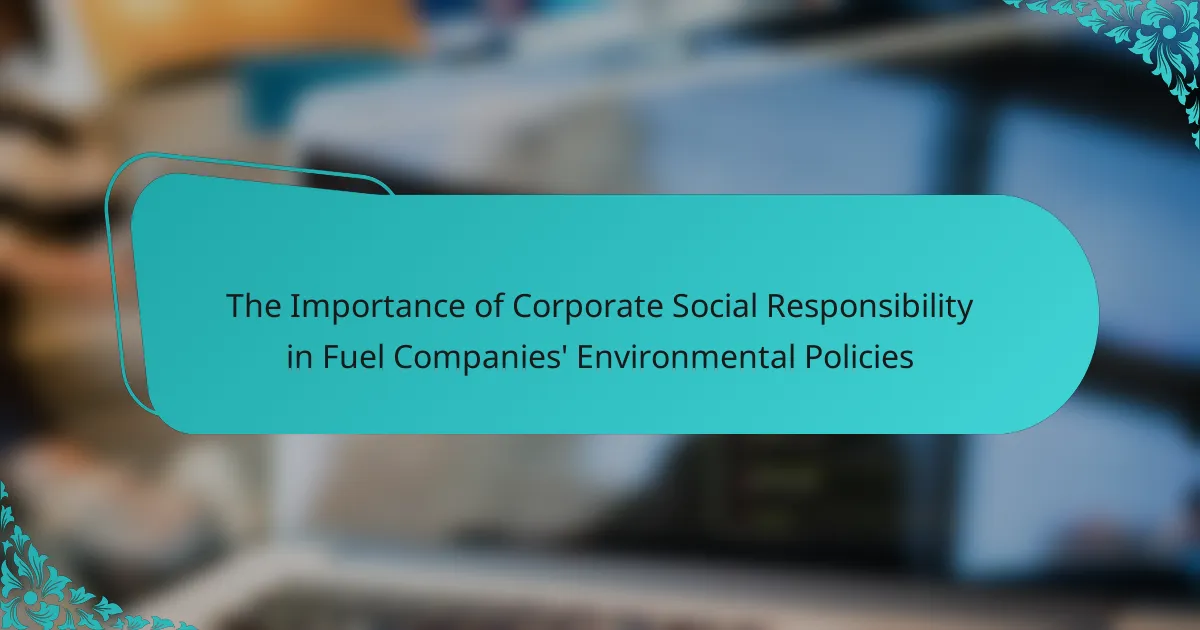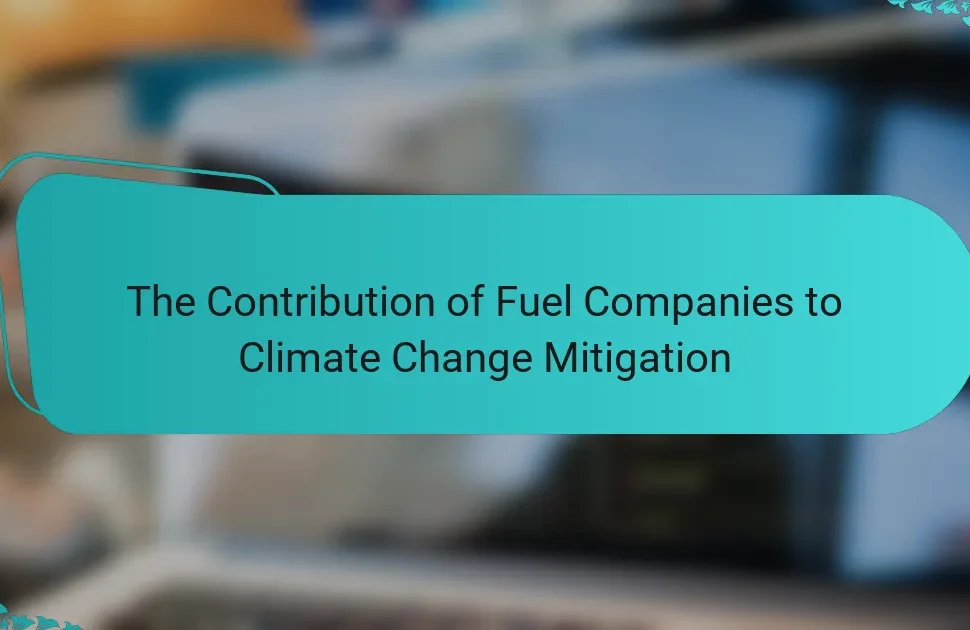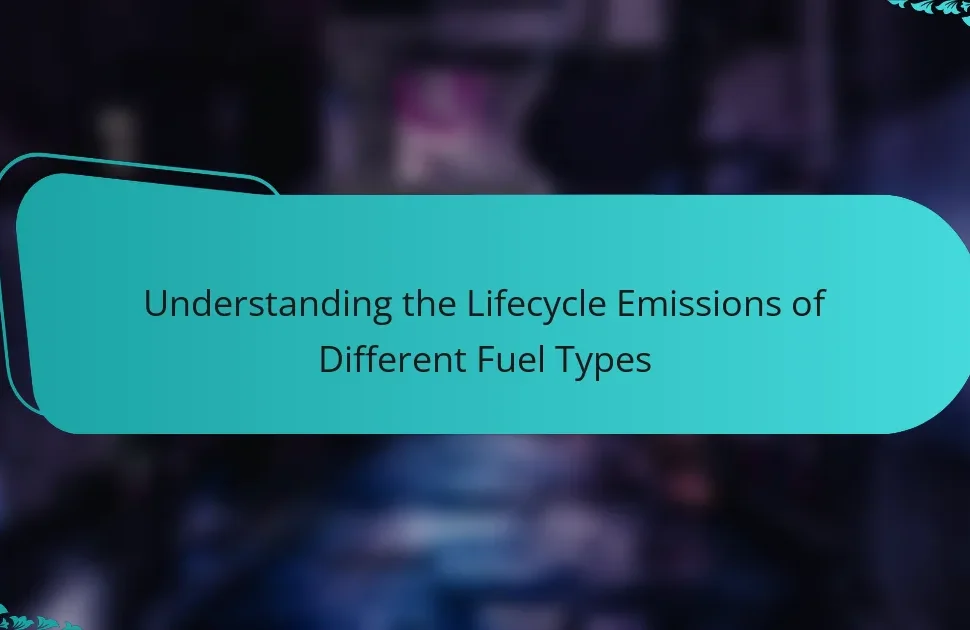
What is Corporate Social Responsibility in Fuel Companies?
Corporate Social Responsibility (CSR) in fuel companies refers to their commitment to ethical practices and sustainable development. It involves integrating social, environmental, and economic concerns into their operations and interactions with stakeholders. Fuel companies engage in CSR to minimize their environmental impact, support local communities, and ensure transparency in their business practices. Examples of CSR initiatives include reducing greenhouse gas emissions, investing in renewable energy projects, and promoting community development programs. According to a 2021 report by the International Energy Agency, implementing effective CSR strategies can enhance a company’s reputation and stakeholder trust, ultimately leading to long-term success.
Why is Corporate Social Responsibility important for fuel companies?
Corporate Social Responsibility (CSR) is important for fuel companies because it enhances their reputation and builds trust with stakeholders. Fuel companies face scrutiny due to environmental concerns. CSR initiatives demonstrate a commitment to sustainability and ethical practices. Positive CSR practices can lead to increased customer loyalty. According to a 2020 Nielsen report, 73% of consumers are willing to change their consumption habits to reduce environmental impact. Implementing CSR can also mitigate regulatory risks. Companies that prioritize CSR often experience better financial performance. This correlation was highlighted in a study by Harvard Business School, which found that firms with strong CSR strategies outperform their peers in stock performance.
How does Corporate Social Responsibility impact company reputation?
Corporate Social Responsibility (CSR) positively impacts company reputation. Companies that engage in CSR practices are often viewed more favorably by consumers. A 2020 study by Cone Communications found that 87% of consumers would purchase a product based on a company’s commitment to social and environmental issues. CSR initiatives can enhance brand loyalty and trust among customers. Additionally, companies with strong CSR programs can attract better talent. Employees prefer to work for organizations that align with their values. This alignment can lead to higher employee satisfaction and retention rates. Overall, effective CSR can differentiate a company in a competitive market.
What role does transparency play in Corporate Social Responsibility?
Transparency is crucial in Corporate Social Responsibility (CSR). It fosters trust between companies and stakeholders. When companies openly share their practices, stakeholders can assess their social and environmental impacts. Transparency encourages accountability, prompting companies to adhere to ethical standards. Research shows that 94% of consumers are likely to be loyal to a brand that offers complete transparency. This loyalty can lead to increased sales and market share. Furthermore, transparent practices can enhance a company’s reputation, attracting investors and partners. Thus, transparency serves as a foundation for effective CSR in fuel companies’ environmental policies.
What are the key components of Environmental Policies in fuel companies?
Key components of Environmental Policies in fuel companies include emissions reduction, resource conservation, and regulatory compliance. Emissions reduction focuses on minimizing greenhouse gas outputs. Fuel companies often implement technologies to lower carbon emissions. Resource conservation emphasizes efficient use of water and energy. Many companies adopt practices to reduce waste generation. Regulatory compliance ensures adherence to environmental laws and standards. Companies frequently conduct audits to assess environmental impact. Stakeholder engagement is essential for transparency and accountability. Finally, continuous improvement processes help companies adapt to new environmental challenges.
How do fuel companies define their environmental objectives?
Fuel companies define their environmental objectives through a commitment to sustainability and regulatory compliance. They often establish specific goals such as reducing greenhouse gas emissions and minimizing environmental impact. Many fuel companies adopt frameworks like the ISO 14001 standard for environmental management systems. These frameworks guide their strategies and practices in managing environmental responsibilities. Additionally, companies may set targets for renewable energy usage and waste reduction. By aligning their objectives with international climate agreements, they demonstrate accountability. For instance, many companies report their progress through sustainability reports. These reports provide transparency and help stakeholders assess their environmental performance.
What initiatives are commonly included in these environmental policies?
Common initiatives included in environmental policies are sustainability practices, emissions reduction strategies, and waste management programs. Sustainability practices often involve promoting renewable energy sources and enhancing energy efficiency. Emissions reduction strategies typically focus on lowering greenhouse gas emissions through technology improvements and cleaner fuels. Waste management programs aim to minimize waste generation and promote recycling efforts. These initiatives are essential for compliance with regulations and improving corporate reputation. Many fuel companies adopt these measures to align with global environmental standards and consumer expectations.
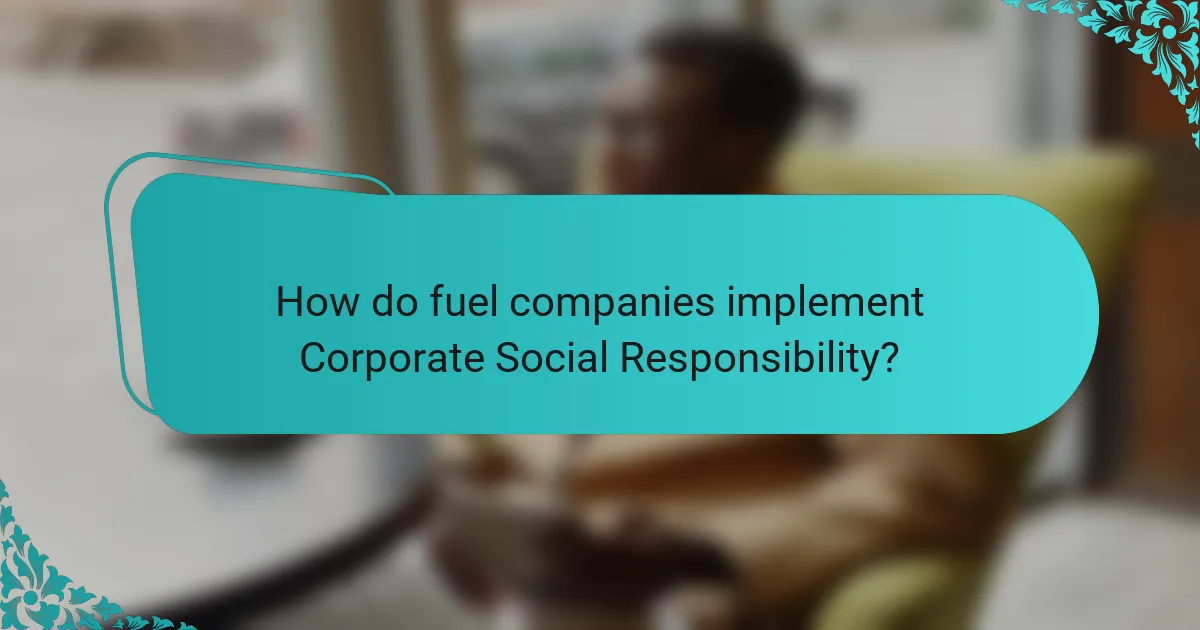
How do fuel companies implement Corporate Social Responsibility?
Fuel companies implement Corporate Social Responsibility (CSR) by adopting sustainable practices and engaging in community initiatives. They invest in renewable energy projects to reduce carbon footprints. Many fuel companies also focus on reducing emissions through advanced technologies. They conduct environmental impact assessments to ensure compliance with regulations. Additionally, these companies often support local communities through educational and health programs. They publish sustainability reports to communicate their CSR efforts transparently. By collaborating with NGOs, fuel companies enhance their social and environmental contributions. This multifaceted approach demonstrates their commitment to responsible business practices.
What strategies do fuel companies use to enhance their environmental impact?
Fuel companies enhance their environmental impact through various strategies. They invest in renewable energy sources, such as solar and wind power. This transition helps reduce reliance on fossil fuels. Many companies implement carbon capture and storage technologies. These technologies capture CO2 emissions from their operations. Fuel companies also focus on improving energy efficiency in their processes. This reduces overall energy consumption and emissions. Additionally, they engage in reforestation and habitat restoration projects. These initiatives help offset carbon footprints. Many fuel companies publish sustainability reports to track their progress. This transparency holds them accountable to stakeholders and the public.
How do partnerships with NGOs influence Corporate Social Responsibility efforts?
Partnerships with NGOs enhance Corporate Social Responsibility (CSR) efforts by providing expertise and credibility. NGOs often have specialized knowledge in social and environmental issues. This collaboration helps companies align their CSR strategies with best practices. Additionally, NGOs can offer insights into community needs and expectations. This alignment fosters trust and transparency between companies and stakeholders. For instance, a study by the Harvard Business Review found that companies partnering with NGOs saw a 20% increase in stakeholder engagement. This indicates that such partnerships can lead to more effective CSR initiatives. Overall, NGOs play a crucial role in shaping and improving CSR efforts in the corporate sector.
What role does stakeholder engagement play in policy development?
Stakeholder engagement plays a crucial role in policy development. It ensures that diverse perspectives are considered in the decision-making process. Engaging stakeholders fosters transparency and builds trust among affected parties. This collaboration can lead to more effective and sustainable policies. Research shows that policies informed by stakeholder input are more likely to be accepted and implemented successfully. For example, a study by the World Resources Institute highlights that inclusive policy development can improve environmental outcomes. Thus, stakeholder engagement is essential for creating relevant and impactful policies.
What challenges do fuel companies face in adopting Corporate Social Responsibility?
Fuel companies face significant challenges in adopting Corporate Social Responsibility (CSR). These challenges include regulatory pressures, public scrutiny, and stakeholder expectations. Regulatory frameworks often require compliance with environmental standards, which can be complex and costly. Public scrutiny can lead to reputational risks, especially when companies are perceived as environmentally harmful. Stakeholders, including investors and consumers, increasingly demand transparency and ethical practices. Additionally, the transition to sustainable practices may require substantial investment and innovation. According to a 2021 report by the International Energy Agency, many fuel companies struggle to balance profitability with sustainable development goals. This tension complicates their CSR initiatives.
How do regulatory pressures affect Corporate Social Responsibility initiatives?
Regulatory pressures significantly influence Corporate Social Responsibility (CSR) initiatives. These pressures often compel companies to adopt more stringent environmental and social practices. For instance, legislation may require fuel companies to reduce emissions or improve labor conditions. Compliance with these regulations can lead to enhanced corporate reputation and stakeholder trust. Research shows that firms facing strict regulations are more likely to invest in CSR activities. A study by the Harvard Business Review highlights that regulatory frameworks drive firms to innovate in sustainable practices. This alignment of CSR with regulatory demands not only mitigates risks but also creates competitive advantages.
What are the financial implications of implementing these policies?
Implementing corporate social responsibility (CSR) policies in fuel companies can lead to significant financial implications. These implications include increased operational costs due to investments in sustainable practices. For instance, transitioning to renewable energy sources often requires substantial upfront capital.
Additionally, companies may experience enhanced brand reputation, which can drive customer loyalty and increase sales. Research shows that companies with strong CSR commitments often see a rise in stock performance. A 2020 study by Harvard Business School found that firms with robust CSR strategies outperformed their peers by 4.8% annually.
Moreover, regulatory compliance can incur costs but can also mitigate potential fines and legal fees. By proactively addressing environmental concerns, companies can avoid penalties associated with non-compliance. Overall, while initial costs may rise, long-term financial benefits and risk mitigation can outweigh these expenses.
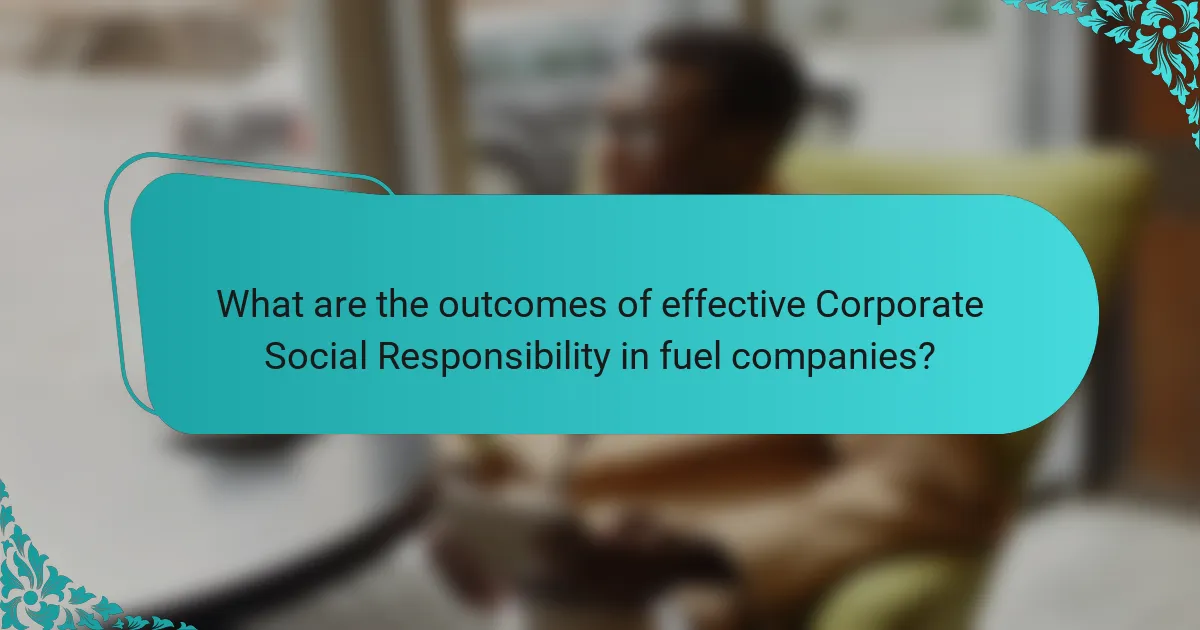
What are the outcomes of effective Corporate Social Responsibility in fuel companies?
Effective Corporate Social Responsibility (CSR) in fuel companies leads to enhanced reputation and trust among stakeholders. This positive perception can increase customer loyalty and attract new clients. Research indicates that 70% of consumers prefer brands with strong CSR commitments. Fuel companies that engage in responsible environmental practices often see reduced regulatory risks. This is due to compliance with environmental laws and regulations, leading to fewer fines and penalties. Additionally, effective CSR initiatives can result in cost savings through energy efficiency and waste reduction. Companies may also experience improved employee morale and retention, as workers prefer to be associated with socially responsible organizations. Overall, effective CSR contributes to sustainable business practices and long-term profitability.
How does Corporate Social Responsibility contribute to sustainability in fuel companies?
Corporate Social Responsibility (CSR) enhances sustainability in fuel companies by promoting environmentally friendly practices. CSR initiatives encourage fuel companies to reduce greenhouse gas emissions. They often invest in renewable energy sources as part of their commitment to sustainability. Additionally, CSR fosters community engagement and supports local environmental projects. This approach helps mitigate the negative impacts of fuel extraction and production. Research indicates that companies with strong CSR programs see improved public perception and customer loyalty. A 2020 study by Harvard Business Review found that companies prioritizing CSR experienced a 20% increase in brand reputation. Therefore, CSR plays a crucial role in aligning fuel companies with sustainable development goals.
What measurable benefits can be observed from these initiatives?
Measurable benefits from corporate social responsibility (CSR) initiatives in fuel companies include reduced carbon emissions and improved community relations. Fuel companies implementing CSR often report a decrease in greenhouse gas emissions. For instance, a study found that companies adopting sustainable practices reduced emissions by up to 30%. Enhanced community engagement leads to increased trust and brand loyalty. Research indicates that companies with strong CSR initiatives experience a 20% increase in customer loyalty. Additionally, operational efficiencies gained through sustainable practices can lead to cost savings. A report showed that companies implementing energy-efficient technologies saved an average of 15% on energy costs. These measurable benefits demonstrate the positive impact of CSR initiatives on environmental policies within fuel companies.
How do these outcomes impact community relations?
Outcomes of corporate social responsibility (CSR) initiatives significantly influence community relations. Positive environmental outcomes foster trust between fuel companies and local communities. When companies reduce pollution, communities experience improved health and quality of life. This can lead to increased community support and collaboration on future projects. Conversely, negative outcomes can damage relationships, resulting in community opposition and protests. Research indicates that companies with strong CSR commitments see a 20% increase in community support, as reported by the Harvard Business Review. Thus, effective CSR practices are essential for maintaining positive community relations.
What best practices should fuel companies follow for effective Corporate Social Responsibility?
Fuel companies should adopt transparency, stakeholder engagement, and sustainability initiatives for effective Corporate Social Responsibility (CSR). Transparency involves openly sharing information about environmental impacts and CSR efforts. This builds trust with consumers and stakeholders. Stakeholder engagement means actively involving communities and employees in decision-making processes. This fosters collaboration and addresses local concerns. Sustainability initiatives focus on reducing carbon footprints and investing in renewable energy sources. According to a 2021 report by the International Energy Agency, transitioning to sustainable practices can significantly lower emissions. Implementing these best practices can enhance a company’s reputation and ensure long-term viability.
How can fuel companies continuously improve their environmental policies?
Fuel companies can continuously improve their environmental policies by adopting innovative technologies and practices. Implementing cleaner extraction and refining processes reduces emissions significantly. Investing in renewable energy sources can decrease reliance on fossil fuels. Regularly assessing environmental impacts through audits helps identify areas for improvement. Engaging with stakeholders fosters transparency and accountability. Setting measurable sustainability goals drives progress and encourages responsibility. Training employees on environmental best practices enhances compliance and awareness. Collaborating with environmental organizations can provide valuable insights and resources.
What role does employee involvement play in successful Corporate Social Responsibility?
Employee involvement is crucial for successful Corporate Social Responsibility (CSR). Engaged employees contribute to the development and implementation of CSR initiatives. Their insights help identify relevant social and environmental issues. This leads to more effective and targeted CSR strategies. Studies show that companies with high employee involvement in CSR see improved performance. According to a 2020 report by the Harvard Business Review, organizations with engaged employees are 21% more profitable. Employee participation fosters a culture of accountability and commitment to CSR goals. Additionally, it enhances the company’s reputation and strengthens stakeholder relationships.
Corporate Social Responsibility (CSR) in fuel companies encompasses their commitment to ethical practices, sustainability, and stakeholder engagement. The article examines the significance of CSR in enhancing company reputation, building trust, and addressing environmental challenges. Key components include transparency in operations, emissions reduction strategies, and community support initiatives. It also highlights the importance of stakeholder engagement, regulatory compliance, and the financial implications of implementing effective CSR policies. Overall, the article underscores the role of CSR in promoting sustainable practices and improving community relations within the fuel industry.
